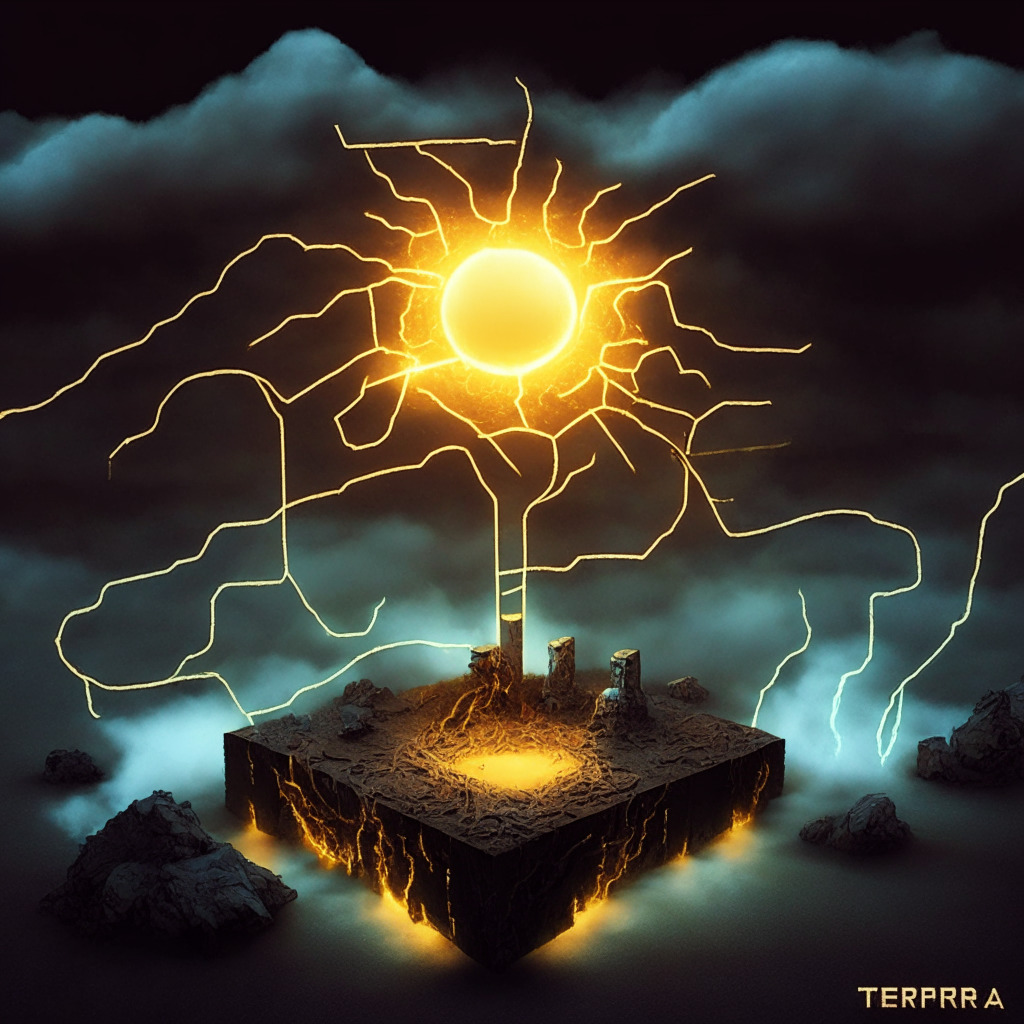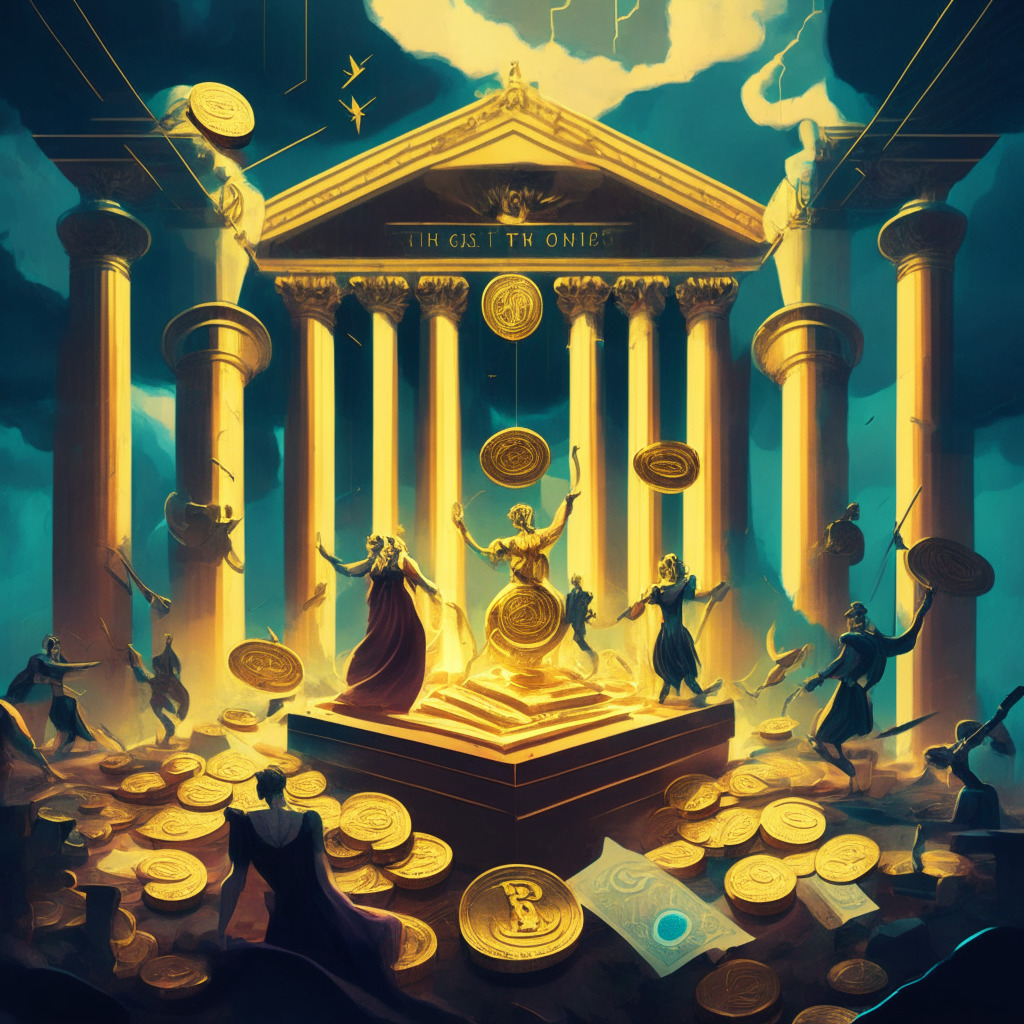“A staunch crypto advocate, Representative Patrick McHenry, has provisionally stepped into the role of US House Speaker. McHenry has shown appreciation for the significance of American innovation and advocated for stablecoin regulation. These transitions bring opportunities and challenges for digital currencies and their regulation.”
Search Results for: votes
Celsius Network’s Rocky Road to Redemption: From Bankruptcy to Bitcoin Mining
Bankrupt cryptocurrency lender Celsius Network aims to return customers’ funds by year-end and transform into a Bitcoin mining venture, NewCo. Despite hurdles, the $450 million restructuring plan proposes repayment using Bitcoin and Ethereum and stock in the new company. The future of these ambitious plans remains uncertain.
Argentina Elections: Battle of Digital Peso vs Dollar – Global Implications and Skeptic Views
In the upcoming Argentinian elections, top candidate Sergio Massa proposes the creation of a Central Digital Currency, aiming to rejuvenate an economy reeling from long-term hyperinflation. However, his rival, Javier Milei, favors a complete shift to the US dollar, accusing the peso of facilitating government corruption.
Government Shutdown Dodged: Possible Fallout for Cryptocurrency Regulation
“The future of cryptocurrency regulation was at risk with the potential for a government shutdown. This stalemate could have hindered several key crypto-focused bills, including the Financial Innovation and Technology for the 21st Century Act, the Blockchain Regulatory Certainty Act, among others, shaping crypto’s future.”
US Government Shutdown’s Potential Impact on Crypto Regulations and Legislation
A potential US government shutdown could significantly impact digital assets and crypto-related legislation. Regulatory operations could stall, bills beneficial to digital assets may hit roadblocks, and key financial regulators would operate with limited enforcement and oversight capabilities. Blockchain regulations may be deprioritized amid other post-shutdown concerns.
Huge Debates Arising Over Validator Commissions and Infrastructure Provider Funding in Terra Classic Community
The Terra Classic community debates two critical proposals: correcting an unintentional 0% validators’ commission rate, which current votes lean towards rejection, and the recognition and financial support for top-tier infrastructure provider, Allnodes which also currently faces rejection. Concurrently, BTCMTX offers an innovative Stake-to-Mine model making Bitcoin mining accessible.
Optimism Navigates Through Financial Headwinds Ahead of Major Token Unlock
“Ethereum layer 2 network, Optimism, faces a financial downturn as its token, OP has dropped almost 10% in the run-up to its planned token unlock on September 30. This downward trajectory in prices reflects the increased supply’s impact on asset value.”
Impending Token Unlock for Optimism: A Balance of Growth and Uncertainty
The Ethereum layer 2 network, Optimism, anticipates a token unlock on September 30, posing some uncertainty for its native token. This unlock involves unwrapping 24.16 million tokens (around $31.1 million), representing a 3% sliver of total circulating supply. Preluding the unlock, Optimism announces a release of 570 million tokens for future airdrops, with allocations based on community participation and governance votes.
Crypto Progress: Are Pending US Bills at Risk Due to a Government Shutdown?
“The imminent US government shutdown threatens several crypto-focused bills awaiting a House vote, casting uncertainty over their fate. The longer the shutdown persists, the more delayed will be crucial crypto reforms. In this scenario, potentially causing regulatory stagnation in crypto markets.”
How US Regulations Can Spur Transparency In The Cryptocurrency Industry
“Senator Sherrod Brown has expressed concern about the cryptocurrency industry’s lack of self-regulation and transparency, predominantly benefiting insiders and executives. He urged key U.S. financial policy-makers to increase transparency and balance fostering innovation with protecting consumers in the crypto industry.”
Regulatory Tightrope: Striking Balance between Crypto Transparency and Investor Safety
U.S. Sen. Sherrod Brown’s call to regulators for promoting transparency and safeguarding investor interests suggests a push for stronger authority over digital assets. This results in questioning the readiness of the crypto enthusiasts to embrace potential regulatory changes in the crypto realm.
Navigating the Crypto-Regulatory Landscape: An Insight into the EU’s Directive on Administrative Cooperation
The eighth iteration of the Directive on Administrative Cooperation (DAC8), which introduces mandatory tax reporting for cryptocurrency transactions, has received overwhelming support from members of the European Parliament. DAC8 is expected to aid tax authorities in monitoring and assessing cryptocurrency transactions to improve transparency and counter tax fraud.
EU’s DAC8 Cryptocurrency Tax Reporting Rule: Boost for Accountability or Over-Regulation Menace?
The Directive on Administrative Cooperation (DAC8) rule, aimed at monitoring and evaluating all cryptocurrency transactions within the European Union, was recently approved at the EU parliament. The goal is to assist tax authorities in tracking crypto-assets trade and profits, reducing tax fraud and evasion. However, it raises questions about potential over-regulation and its impact on member countries’ autonomy.
Rising Tide in Terra Luna Classic: Curbing Spam Proposals or Stifling Innovation?
The Terra Luna Classic community considers raising the minimum deposit requirement to combat spam proposals. Supporters believe this will increase the quality of proposals, yet critics fear it could deter smaller initiatives and stifle innovation.
Legal Struggles of Celsius Ex-Head Highlight Crypto’s Conflict with Traditional Law
“Ex-Celsius head Alex Mashinsky’s assets have been frozen due to a criminal lawsuit involving allegations of securities fraud related to the CEL token. Celsius’s creditors now face a major decision: potentially offload assets to regain access to their investments, underscoring the relentless battle between traditional legal infrastructure and the elusive crypto world.”
Decentralized Exchange dydx’s Token Migration to Layer 1: A Unanimous Move or Market Hype?
“Decentralized exchange dydx gains almost universal user approval to migrate to its latest version, adopting DYDX as its Layer 1 token for its imminent blockchain. The community’s vote facilitates the token’s transition from Ethereum to a Layer 1 appchain within the Cosmos ecosystem.”
Genesis Bankruptcy Fallout: A Battle of Crypto Titans Over Fairness and $3.4 Billion Liabilities
Genesis, a crypto lender facing bankruptcy, is being accused by creditors, including Gemini and Digital Currency Group, of manipulating bankruptcy proceedings with their proposed settlement. The settlement, seen by some as giving preferential treatment to certain creditors, includes Alameda Research receiving $175 million from Genesis’s assets. Critics argue it deviates from acceptable Chapter 11 protocol.
Controversy Clouds Genesis Global Capital’s Bankruptcy Settlement with FTX
Bankrupt crypto lender, Genesis Global Capital, is under scrutiny regarding its proposed $175 million settlement with FTX, accused of manipulating the bankruptcy process through vote-buying. Genesis’s future, and the recovery of creditors’ funds, now lies in the hands of Bankruptcy Judge Sean Lane.
Preserving Decentralization: Ethereum Staking Giants Pledge to Self-Limit Market Share
Several leading Ethereum liquid staking providers, including Rocket Pool, StakeWise, Stader Labs, Puffer Finance, and Diva Staking, are adopting a self-limiting strategy to own no more than 22% of the Ethereum staking market, thus working to avoid a potential increase in staking centralization. This move is in contrast to entities like Lido Finance, which advocates for growth and dismisses the self-limitation approach.
Navigating the Promise and Perils of a Blockchain-Powered Future
“Blockchain technology presents unprecedented opportunities and potential pitfalls, transforming sectors like finance and supply chains, and democratizing financial access. However, there are security risks, regulatory challenges and concerns over data misuse and environmental impacts. Effective methods to capitalize this technology while mitigating risks are crucial.”
The Controversial Loan Request by Wintermute Trading: A Threat to Yearn’s Decentralization?
“Wintermute Trading faces criticism as they negotiate a loan of 350 YFI tokens from Yearn Finance. Yearn’s supporters challenge the benefit to Yearn from this deal, questioning its alignment with Yearn’s philosophy of decentralized finance. The main issue lies in Wintermute’s intention to borrow Yearn’s governance token, potentially undermining Yearn’s foundation of decentralization.”
The Fall of CEL Tokens: A Tale of Volatility, Valuation and Bankruptcy in Crypto Markets
The attempt to value CEL tokens at $0.80 met an unfortunate end, leading to a proposed wind-up plan at $0.25. Token holders’ plea about maintaining the original value endured the harsh reality of market manipulations. Amid the legal tussles and uncertainties, creditors have a month to cast their votes on the sale plan.
AI-Generated Art: Pushing Boundaries or Distorting Authenticity?
“Botto, an AI creation, is redefining AI-generated art by learning and adapting to create new pieces that are evaluated through community votes and mintified as NFTs. However, the debate remains: can artwork encoded with emotion and symbolism be truly generated by AI?”
Surge in Stablecoin Use Amid Argentina’s Political Turmoil: A Deep Dive into Crypto’s Role in National Economy
Amidst Argentina’s economic crisis and hyperinflation, Argentinians are significantly increasing their purchase of stablecoins as a viable way to protect their savings. The trend, spurred by government restrictions on foreign currency buying and a depreciating peso, also sees an increasing number of transactions and salaries being paid in cryptocurrencies. The upsurge coincides with the rise of presidential candidate, Javier Milei, who holds a positive stance towards cryptocurrencies.
Navigating the Aftermath: Dealing with the $12M Curve Exploit Loss in Crypto Lending
JPEG’d, an NFT-collateralized lending app, recently lost nearly $12 million in a Curve exploit. The swift recovery action led to the return of 90% of funds, but left a significant unresolved loss. The event highlights the vulnerabilities and risk management requirements in the dynamic crypto realm.
Surge of Bitcoin in Argentina: A Result of Political Shifts or an Inflation Hedge?
“Bitcoin has surged in Argentina following the primary win of Bitcoin-friendly candidate, Javier Milei, attaining new highs in Argentine’s crypto market. Interestingly, this rise is tied to Milei’s successful run, who plans to abolish the central bank and sees Bitcoin as a counter against inflation exploitation.”
Crypto-friendly Libertarian Candidate’s Surprise Victory in Argentina: A Shift or a Risk?
“Libertarian candidate Javier Milei, known for endorsing Bitcoin and advocating for abolition of central banks, surprisingly won the preliminary presidential election in Argentina with 30.5% of votes. His success may affect Argentina’s crypto adoption and policy-making considering prevalent economic issues like the high inflation rate.”
Bitcoin Advocate Leading Argentine Primary Elections: Implications for Economic Future
Javier Milei, a libertarian candidate known for supporting Bitcoin and criticizing central banks, is leading in Argentina’s primary presidential election. Despite his enthusiasm for Bitcoin, Milei doesn’t advocate for its adoption as legal tender, instead promoting “dollarization” to combat rampant inflation.
BNB Chain’s Pioneering Security Updates: Exploring the Potential Impact of Plato and Hertz Upgrades
“BNB Chain is set for an upgrade to boost security infrastructure and ensure compatibility with other EVM blockchain networks. Known as the Plato upgrade, it introduces BEP-126 to implement a rapid finality mechanism to prevent block reverts and chain reorganization for better trust and system efficiency. Another upgrade, the Hertz hard fork, is aimed at keeping BNB Chain updated with the latest Ethereum developments.”
The Dilemma of Terra Luna Classic (LUNC) and the Rise of XRP20: A Cryptocurrency Analysis
Terra Luna Classic (LUNC) saw a 1% climb to $0.00007818 recently, but this doesn’t overshadow its long-term decline, primarily due to community discord about its development. A proposed burning of ~$800 million in LUNC’s associated stablecoin received meager support, hampering recovery possibilities. Meanwhile, ERC-20 token XRP20 shows promising growth potential.
Rocketing Reddit Tokens: The Rise of MOON and BRICK on Kraken’s Platform
“MOON and BRICK, Reddit community tokens, have seen a significant boost, with Moons increasing by 47% and Bricks by 50% following support from cryptocurrency heavyweight exchange, Kraken. These tokens, rewards for user activities within their respective communities, can be traded, tipped, or used in unique ways within the community.”
Stablecoin Bill Approval: Bipartisanship Triumph or Political Posturing?
The recent passing of the stablecoin bill in the House Financial Services Committee highlights ongoing political tension in Washington. Despite initial bipartisan support, the bill stands as a glaring representation of political unity’s failure, caught in the crossfire of political maneuvers, with even well-intentioned legislation teetering on the edge of oblivion.































